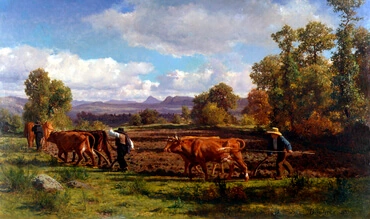Genesi 44:24
To many Protestant and Evangelical Italians, the Bibles translated by Giovanni Diodati are an important part of their history. Diodati’s first Italian Bible edition was printed in 1607, and his second in 1641. He died in 1649. Throughout the 1800s two editions of Diodati’s text were printed by the British Foreign Bible Society. This is the more recent 1894 edition, translated by Claudiana.
Terra

C'è differenza di significato tra "terra" e "terreno"? All'inizio non sembra; entrambi si riferiscono al suolo che costituisce la massa terrestre del pianeta che abitiamo.
Ma se ci pensate, i significati sono sfumati in direzioni diverse. Noi tendiamo a usare "terra" in un senso più generale - intendendo tutto il suolo ovunque o qualsiasi suolo in qualsiasi luogo. "Terra" è più specifico, riferendosi alla porzione di terra su cui ci capita di stare, o a qualche porzione di terra che intendiamo coltivare o usare in altro modo.
E così è nella Bibbia. "Terra" si riferisce all'esterno di una persona o di una comunità - i loro pensieri e azioni quotidiane - in un senso ampio e generale. "Terra" si riferisce alle parti della nostra vita esterna che sono pronte per essere coltivate, pronte per essere messe in uso.
La coltivazione, naturalmente, comporta l'allentamento del terreno (rompere le nostre abitudini e pensieri che ci distraggono) e piantare i semi (veri concetti e idee che nascono dal desiderio di essere buoni). Quando questi semi iniziano a crescere, cominciamo ad essere veramente utili.
In breve, quindi, "terreno" nella Bibbia può significare una persona o una comunità che è ricettiva all'insegnamento del Signore. Può anche significare una persona o una chiesa che ha ricevuto l'insegnamento del Signore e lo sta mettendo in pratica.
(Referencat: Arcana Coelestia 94, 268, 345, 377, 566, 1068, 2327, 6135 [1-2], 6154)
Arcana Coelestia #2327
2327. 'And bowed down with his face towards the ground' means humiliation. This becomes clear without explanation. The reason why in the past, especially in the representative Churches, people would bow so far down that their faces touched the ground, was that 'the face' meant man's interiors, 358, 1999. And they did so down 'to the ground' because 'the dust of the ground' meant that which is profane and condemned, 278. In doing this they represented the fact that of themselves they were profane and condemned. They therefore prostrated themselves face downwards on the ground, indeed they wallowed in dust and ashes, and also cast dust or ashes over their heads, as becomes clear from Lamentations 2:10; Ezekiel 27:30; Micah 1:10; Joshua 7:6; Revelation 18:19; and elsewhere.
[2] By these actions they represented a state of true humility, which can in no way exist unless people acknowledge that of themselves they are profane and condemned, and so of themselves are incapable of looking towards the Lord where everything is Divine and Holy. To the extent therefore that a person acknowledges his own condition he can possess true humility, and when engaged in worship can have real devotion. For all worship must contain humility, and if separated from it no adoration and so no worship at all is present.
[3] The reason a state of humility is vital to worship itself is that insofar as the heart is humbled self-love and all resulting evil come to an end; and insofar as these come to an end good and truth, that is, charity and faith, flow in from the Lord. For what above all else stands in the way of their being received is self-love. Indeed within self-love there lies contempt for all others in comparison with oneself; there lies hatred and revenge if one is not venerated most highly; and there lies mercilessness and cruelty within it, and thus the worst evils of all into which good and truth cannot possibly be introduced, since they are completely opposite.






